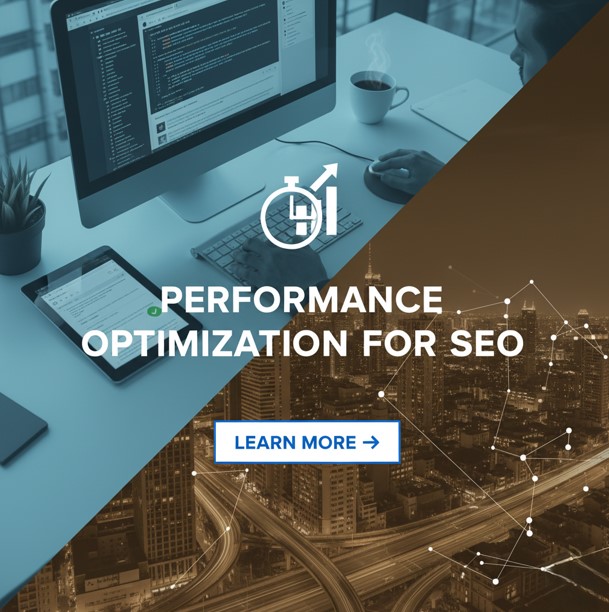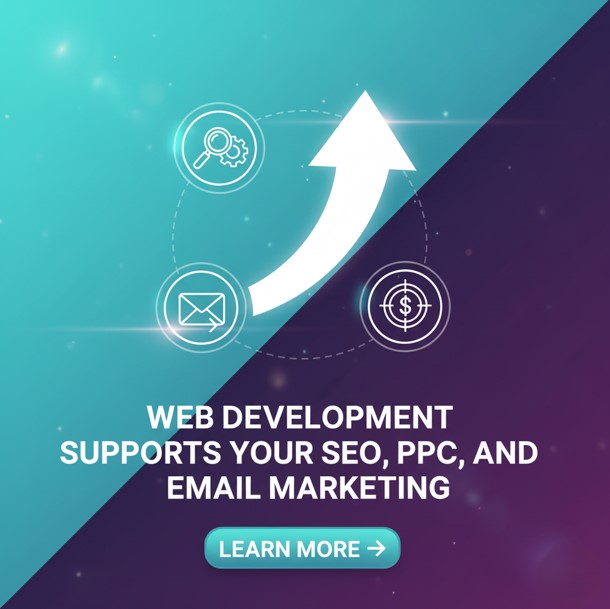Your website is the backbone of all digital marketing efforts, and the quality of its development directly determines the success of SEO, PPC, and email marketing campaigns. Strong web development improves site speed, technical SEO, mobile responsiveness, tracking accuracy, and user experience—factors that boost search rankings, increase PPC conversions, and enhance email performance.
Your website serves as the foundation for every digital marketing strategy you deploy. While many businesses treat web development as a separate entity from their marketing efforts, the reality is far different. The way your site is built, structured, and optimized directly impacts the success of your SEO campaigns, PPC advertisements, and email marketing initiatives.
Understanding this connection can transform your marketing results. When web development and marketing work in harmony, you create a powerful ecosystem that amplifies each campaign’s effectiveness. Poor web development decisions can sabotage even the most well-crafted marketing strategies, while strategic development choices can elevate mediocre campaigns to extraordinary success.
This comprehensive guide explores how web development intersects with your core marketing channels and provides actionable insights to maximize their combined potential.
The Foundation: How Web Development Impacts Marketing Performance

Web development creates the technical infrastructure that either supports or hinders your marketing efforts. Every line of code, every design decision, and every technical implementation affects how users interact with your marketing campaigns.
Site speed exemplifies this relationship perfectly. Google considers page load time a ranking factor for SEO, while slow-loading landing pages can devastate PPC conversion rates. Email recipients who click through to sluggish pages abandon them quickly, regardless of how compelling your email content was.
Your site’s architecture also determines how effectively search engines crawl and index your content, how seamlessly PPC traffic converts, and how smoothly email subscribers navigate your offerings. These technical elements work behind the scenes to either amplify or diminish your marketing investments.
Web Development’s Role in SEO Success

Search engine optimization relies heavily on technical foundations that only proper web development can provide. Your development choices directly influence how search engines discover, crawl, and rank your content.
Technical SEO Fundamentals
Site structure forms the backbone of SEO performance. Clean URL structures, logical navigation hierarchies, and properly implemented internal linking help search engines understand your content relationships. When developers create clear site architectures, they enable search engines to efficiently crawl and index your pages.
Mobile responsiveness has become non-negotiable for SEO success. Google’s mobile-first indexing means your mobile site version determines your search rankings. Responsive design ensures consistent user experiences across devices while maintaining SEO performance.
Schema markup implementation requires development expertise to execute properly. This structured data helps search engines understand your content context, potentially earning rich snippets that increase click-through rates from search results.
Performance Optimization for SEO

Page speed optimization demands technical development skills. Compressing images, minifying CSS and JavaScript, implementing browser caching, and optimizing server response times all require development intervention.
Core Web Vitals have become crucial ranking factors. These metrics—Largest Contentful Paint, First Input Delay, and Cumulative Layout Shift—measure user experience elements that developers control through their coding practices.
SSL certificates and HTTPS implementation provide security that Google rewards with ranking boosts. Developers handle the technical aspects of certificate installation and site migration from HTTP to HTTPS.
Content Management and SEO
Content management system selection affects SEO capabilities. Developers who choose SEO-friendly platforms and configure them properly enable content creators to optimize effectively without technical barriers.
URL structure implementation requires development expertise to ensure clean, descriptive URLs that benefit both users and search engines. Proper redirects during site restructures prevent SEO value loss during changes.
Enhancing PPC Campaigns Through Strategic Web Development

Pay-per-click advertising success depends heavily on post-click experiences that web development controls. Your landing pages determine whether PPC traffic converts or bounces, making development decisions crucial for campaign ROI.
Landing Page Optimization
Landing page load speed directly impacts Quality Scores and conversion rates. Google factors page speed into Quality Score calculations, affecting your ad costs and positions. Faster pages also convert better because users don’t abandon them during loading.
Form optimization requires development expertise to create frictionless conversion paths. Properly coded forms with clear validation, logical field ordering, and mobile-friendly designs significantly improve conversion rates.
A/B testing implementation needs development support to execute properly. Testing different page elements, layouts, and conversion flows requires technical knowledge to implement tracking and variations correctly.
Tracking and Analytics Integration
Conversion tracking setup requires development skills to implement properly across different platforms. Google Ads, Facebook Ads, and other platforms need specific tracking codes placed correctly to attribute conversions accurately.
Enhanced e-commerce tracking for online stores demands development expertise to track customer journeys, product performance, and revenue attribution across marketing channels.
Cross-domain tracking becomes essential when PPC traffic moves between different domains or subdomains during the conversion process. Proper implementation ensures accurate attribution and campaign optimization.
User Experience and Conversions
Navigation design affects how PPC traffic explores your site after the initial landing. Intuitive navigation structures help visitors find relevant information quickly, improving conversion likelihood.
Trust signals like security badges, testimonials, and professional design elements require proper development implementation to display effectively and build visitor confidence.
Mobile optimization becomes critical when significant PPC traffic comes from mobile devices. Responsive design and mobile-specific optimizations ensure consistent conversion experiences across devices.
Email Marketing and Web Development Integration
Email marketing success extends beyond inbox delivery to include the web experiences recipients encounter when they click through to your site. Web development choices significantly impact email campaign effectiveness.
Landing Page Continuity
Message matching between emails and landing pages requires development coordination to ensure consistent branding, messaging, and design elements. When recipients click through to pages that don’t match email expectations, conversion rates plummet.
Personalization implementation often requires development work to display dynamic content based on email recipient data. Personalized landing pages that acknowledge the visitor’s email journey create more engaging experiences.
Email Template Development
Responsive email templates require HTML and CSS expertise to render properly across different email clients and devices. Development skills ensure emails display consistently regardless of how recipients view them.
Email automation sequences often link to different landing pages based on recipient behavior. Developers help create these dynamic experiences and ensure tracking works properly across touchpoints.
Tracking and Attribution
Email click tracking implementation requires development coordination between email platforms and website analytics to maintain accurate attribution throughout the customer journey.
Conversion tracking from email campaigns needs proper UTM parameter handling and goal setup in analytics platforms to measure email marketing ROI effectively.
Creating Synergy Between Marketing Channels
The most successful digital marketing strategies leverage web development to create seamless experiences across SEO, PPC, and email marketing channels. This integration amplifies each channel’s effectiveness.
Unified User Experience
Consistent branding across all touchpoints requires development expertise to implement design systems that maintain visual coherence from search results to PPC ads to email landing pages.
Progressive profiling allows you to gather visitor information gradually across multiple touchpoints, requiring development work to implement forms and data collection that don’t overwhelm users.
Data Integration and Insights
Customer data platforms require development and implementation to unify information from SEO organic traffic, PPC campaigns, and email subscribers into comprehensive user profiles.
Cross-channel attribution modeling needs technical implementation to track how different marketing channels work together to drive conversions.
Performance Optimization Across Channels
Site-wide performance improvements benefit all marketing channels simultaneously. When developers optimize site speed, it improves SEO rankings, PPC Quality Scores, and email click-through experiences.
Conversion rate optimization through development improvements lifts performance across all traffic sources, maximizing the return on every marketing dollar invested.
Maximizing Your Marketing Through Strategic Development
Web development isn’t just about creating attractive websites—it’s about building marketing-optimized platforms that amplify your SEO, PPC, and email marketing efforts. Every development decision either supports or undermines your marketing investments.
The most successful businesses recognize this connection and ensure their development and marketing teams collaborate closely. They prioritize technical SEO foundations, create high-converting PPC landing experiences, and build email-friendly web experiences that maximize campaign effectiveness.
Start by auditing your current website’s performance across all three marketing channels. Identify technical barriers that might be limiting your marketing success, then prioritize development improvements that will have the greatest impact on your overall marketing ROI. Your website should be your marketing team’s greatest asset, not their biggest obstacle.
FAQ: Web Development’s Impact on Digital Marketing
1. Why is web development so important for digital marketing?
Web development builds the technical and structural foundation that all marketing channels rely on. A fast, secure, well-structured website boosts SEO rankings, improves PPC Quality Scores, and increases conversions from email campaigns. Without strong development, even excellent marketing strategies fail to perform because users encounter slow pages, errors, or poor experiences.
2. How does web development affect SEO performance?
SEO depends heavily on technical factors such as clean site architecture, fast load speeds, mobile responsiveness, schema markup, and optimized Core Web Vitals. These elements require development expertise. If your site has poor code, broken links, or slow speed, search engines struggle to crawl and index your pages, hurting visibility and rankings.
3. Which development issues hurt SEO the most?
Common SEO-damaging issues include slow page load times, unoptimized images, messy URLs, missing schema markup, poorly structured navigation, duplicate content from CMS misconfigurations, and lack of mobile responsiveness. These technical flaws prevent search engines from understanding and evaluating your site effectively.
4. How does web development influence PPC campaigns?
PPC success depends on what happens after the click, and that’s entirely development-driven. Landing page speed, form functionality, responsive design, tracking accuracy, and trust-building elements (like badges and secure checkout) all determine whether PPC visitors convert. Well-built pages raise Quality Scores, lower ad costs, and increase ROI.
5. Why do landing pages matter so much for PPC?
Landing pages control user experience post-click. Slow, confusing, or poorly designed pages cause high bounce rates and wasted ad spend. Properly developed landing pages load fast, match ad messaging, have frictionless forms, and make it easy for visitors to take action. This directly influences conversions and ad performance.
6. How does web development impact email marketing results?
Email marketing doesn’t end at the inbox—the landing page experience determines whether subscribers convert. If the page loads slowly, appears differently from the email, or breaks on mobile, conversion rates drop. Development ensures consistent branding, responsive pages, smooth navigation, and accurate tracking from email clicks to conversions.
7. What is “message matching,” and why does it matter?
Message matching means ensuring that the landing page matches the email or ad that brought the visitor there. If subscribers click an email offering a discount but land on a page that doesn’t show it, they lose trust. Developers help maintain this consistency through proper page design, dynamic content, and personalization tools.
8. How does web development improve tracking and analytics?
Developers implement tracking codes, conversion tags, pixel scripts, UTM parameters, cross-domain tracking, and enhanced eCommerce analytics. These ensure accurate data collection across SEO, PPC, and email. Without proper development, your analytics will be incomplete or inaccurate, leading to poor marketing decisions.
9. Can development improve website conversion rates?
Yes. Developers improve conversions by optimizing page speed, refining layout structure, improving navigation, coding better forms, enabling A/B testing, and ensuring mobile-friendly design. These enhancements reduce friction and create smoother user journeys, leading directly to higher conversion rates across all marketing channels.
10. How can marketing and development teams work better together?
The best results come when both teams collaborate from the start. Marketers share campaign goals, user behavior insights, and content needs, while developers provide technical solutions, performance improvements, and tracking implementation. Regular communication, joint audits, and shared KPIs help align both teams toward the same outcomes.
11. What tools help bridge the gap between development and marketing?
Tools like Google Tag Manager, Google Analytics, Hotjar, SEMrush, A/B testing platforms, and CMS plugins help developers and marketers work together efficiently. These tools simplify tracking, optimize site performance, and provide insights that guide technical improvements aligned with marketing goals.







